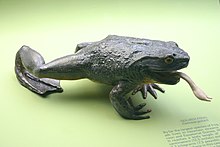Conraua goliath
| Goliath frog | |
|---|---|
 |
|
| Scientific classification | |
| Kingdom: | Animalia |
| Phylum: | Chordata |
| Class: | Amphibia |
| Order: | Anura |
| Family: | Conrauidae |
| Genus: | Conraua |
| Species: | C. goliath |
| Binomial name | |
|
Conraua goliath (Boulenger, 1906) |
|
 |
|
The goliath frog or giant slippery frog (Conraua goliath) is the largest living frog on Earth. Specimens can grow up to 32 cm (12.6 in) in length from snout to vent, and weigh up to 3.25 kg (7.17 lb). This species has a relatively small habitat range in Cameroon and Equatorial Guinea. Its numbers are dwindling due to habitat destruction and its collection for food and the pet trade.
In a sample of 15 individuals, weights ranged between 600 and 3,250 g (1.32 and 7.17 lb), and snout-vent lengths were between 17 and 32 cm (6.7 and 12.6 in). Their eyes can be nearly 2.5 cm (1.0 in) in diameter. The conspicuous tympanum has a diameter around 0.5 cm (0.20 in) and is separated from the eye by about 5 cm (2.0 in) in adults. Goliath frog eggs and tadpoles are about the same size as other frogs despite their very large adult form.
A lateral fold extends from the eye to the posterior portion of the tympanum. Toes are fully webbed, with large interdigital membranes extending down to the toe tips. The second toe is the longest. The skin on the dorsum and on top of the limbs is granular. Dorsal coloration is green sienna, while the abdomen and ventral part of the limbs are yellow/orange. They have acute hearing, but no vocal sac, and also lack nuptial pads.
The goliath frog is normally found in and near fast-flowing rivers with sandy bottoms in the Middle African countries of Cameroon and Equatorial Guinea. These rivers are usually clear and highly oxygenated. Their actual range spans from the last 200 km (120 mi) of the Sanaga basin in Cameroon to the north to the last 50 km (31 mi) of the Benito River basin in Equatorial Guinea to the south. The river systems in which these frogs live are often found in dense, extremely humid areas with relatively high temperatures.
...
Wikipedia

